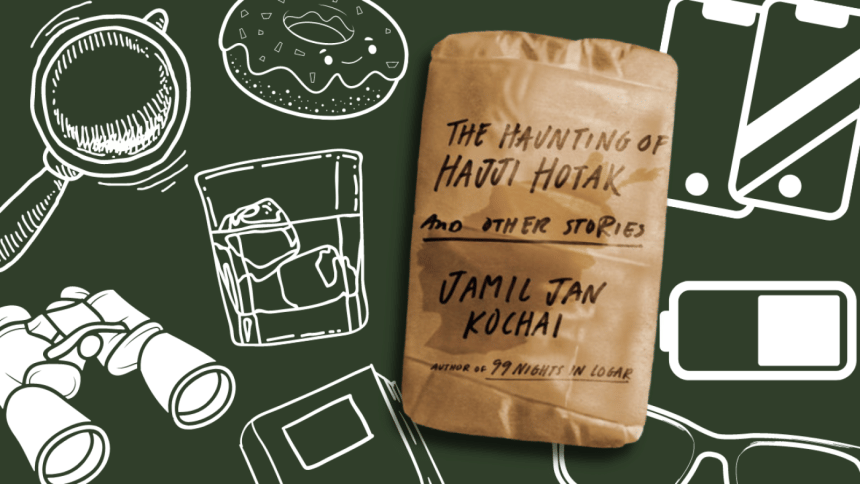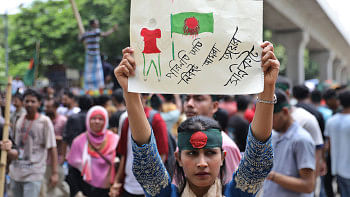Portrait of a family through an intelligence agent’s eyes

The titular character in Jamil Jan Kochai's "The Haunting of Hajji Hotak" (The New Yorker, 2021) is a man named Hajji, who "hardly leaves home at all". An ex-Mujahideen fighter against the Soviet Occupation of Afghanistan, his days are clouded by trauma, grief, and a regular watching of murder mysteries and Western media's coverage about conflicts in the Muslim world. His wife Habibi, on the other hand, is a sociable individual with many friends in Sacramento, whom Hajji cannot stand. Bibi, his mother, is a hawk-eyed observer. Stationed at the living room almost all the time except when she's praying and reciting the Quran, she reports back her daily affairs to her brother who lives in Afghanistan. Hajji and Habibi have five children: Karl, the eldest, who has embraced Marxism and changed his name as such; Lily, the youngest, who has become a vegetarian after witnessing "the vehicular maiming" of a duck; Marvin, who has a 3.8 GPA and makes up for all his missed prayers in the dead of the night; Mo, who has a love affair his parents are clueless about and watches videos of assailants and soldiers persecuting Muslim men; and finally, Mary, who has hacked into nearly everyone's electronic devices and is privy to their personal lives.
The everyday happenings inside this immigrant Afghan household in California are not the focal point of the story, however. Kochai uses a second person voice to indicate that we, the readers, are observing this family from an Intelligence Department's office room, much like the actual unnamed Intelligence Agent here does. We do not know how the agent has access to the family's most intimate moments—it could be a bug on the wall or below the telephone or an ultra-zooming camera outside their house. As the story develops, the reader feels like they are an inseparable part of the story, by virtue of occupying the same space as the Agent's."Habibi begins to weep and Karl mutters an excuse and hangs up. You wonder which of your colleagues is surveilling Karl."
It is a George Saunders-esque world with a South Asian flavour. For the uninitiated: Saunders' stories typically make parodies of capitalistic and imperialistic structures. "The Haunting of Hajji Hotak" is no different. Here, the author critiques the absurdity of America's infamous use of surveillance on migrant communities and the country's deadly legacy in Afghanistan alongside other Western powers' ghastly policies in the Middle East. Discovering this world in South Asian literature felt like a breath of fresh air.
Besides the brilliantly unconventional addition of an Intelligence Agent as the main audience, the story's language, unflinchingly charged with a humorous tone, is enough to keep a reader's eyes glued to the screen. Take it from someone who dreads having to sit through completing short stories—especially the ones on The New Yorker—online. "At first, it was only chicken, but then Lily confessed to her mother that she could no longer stomach beef or lamb, the rest of the culinary trinity of Hajji's household. Habibi made an effort to explain to her daughter that vegetarianism was a slippery slope toward feminism, Marxism, Communism, atheism, hedonism, and, eventually, cannibalism," Kochai writes.
For me, the icing on the cake was the portrayal of the characters' Muslimness, which reminded me of Sahar Mustafah's novel, The Beauty Of Your Face (Norton, W.W & Company, 2021). The story breaks away from a common, tokenistic (and many times, stereotypical) portrayal of Muslims in the Western media. It gives us characters that are very much in touch with their faith (praying the five daily prayers, muttering supplications, reciting Quranic verses).
The story's climax stresses how the Agent, inadvertently, has drowned neck-deep into the river that is the Hotak family. They are very much invested in the trajectories that each of the members is taking. Will Habibi's parents get their US visas? Will Marvin make new friends on campus? What colleges will Mary be applying to? Will Hajji go through his much-needed surgery? A ghost hovering above their shoulders, they sympathise instead of dehumanising the family as was expected. This teaches us that it is humaneness that can bridge the gap between two opposing factions: perhaps if the Agent never had the job of surveilling the family, they would have continued seeing Muslim migrants in a negative light.
"The Haunting of Hajji Hotak" is available on The New Yorker.
Shah Tazrian Ashrafi is a contributor.

 For all latest news, follow The Daily Star's Google News channel.
For all latest news, follow The Daily Star's Google News channel. 








Comments